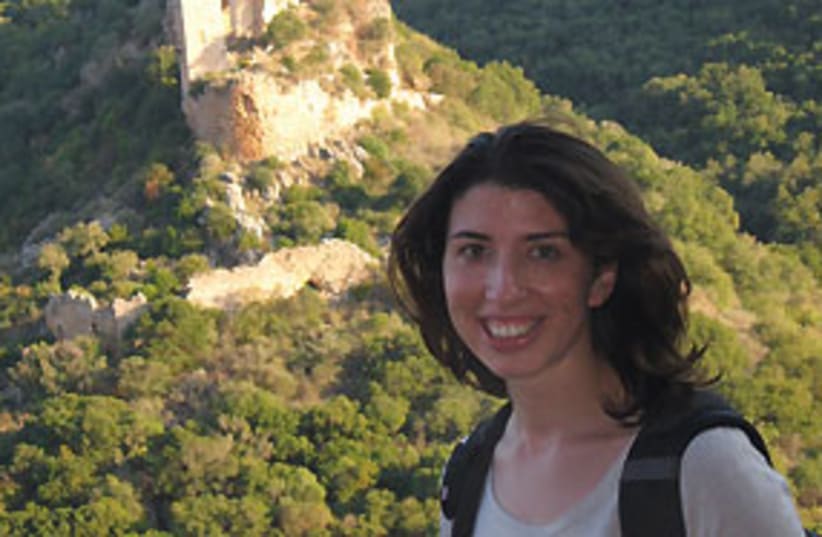Maya has been very busy with rehearsals for the Haifa English Theater and this is the second play in which she has acted. “I always enjoyed theater but never had time in the US for amateur dramatics. I had no acting experience,” she says. But she saw an advertisement for an actor of her age. “Of course I get nervous, but then I forget myself when I am on the stage and want the audience to enjoy themselves.”The HET runs several performances over a period of a couple of weeks in the theater of Beit Hagefen in Haifa. In a small theater she feels close to the audience. “I hear someone laugh and recognize them from my synagogue,” she says.Maya has made a lot of friends from the group, which gives her much more than just an opportunity to act on stage. “They are of mixed ages and have all gone through the aliya process. They have helped me find my way around.”This summer Maya also enrolled in yoga and aerobics classes, one of the list of goals she had set for herself in this second year here.ACCOMMODATIONMaya hopes that they can stay in the North. “We have just bought an apartment in Kiryat Bialik. We prefer a small community and enjoy living so near to nature.”REFLECTIONSMaya has no regrets. “There have been difficult moments but in general people say I look happier here, am growing into myself.”Her advice is to find high-quality ways of linking with other immigrants with a similar background and language. “But it is important to get out and meet people, be Israeli. This is where we live.”Maya says that she looks at politics very differently now. She was exposed to a Diaspora community that supported Israel so much that “Israel can do no wrong. But when you live here you see the complexity of the situation.”Maya is enthusiastic about sharing her experiences and runs a blog:howtobeisraeli.blogspot.com. She publishes a disclaimer: “I can’tactually tell you how to be Israeli because I’m still working on itmyself.” But she manages to describe perfectly the body language ofdrivers using their cellphones and sales clerks trying to convince acustomer to make a purchase.Maya may have had no stage experiences when she auditioned for theHaifa English Theater, but she is certainly observant and capturesperfectly the gestures and the speech mannerisms that are as alien toWestern immigrants as the Hebrew words and grammatical structure.
Arrivals: Busy as a bee
Maya, 26 Pittsburgh to Kiryat Bialik, April 2008.

Maya has been very busy with rehearsals for the Haifa English Theater and this is the second play in which she has acted. “I always enjoyed theater but never had time in the US for amateur dramatics. I had no acting experience,” she says. But she saw an advertisement for an actor of her age. “Of course I get nervous, but then I forget myself when I am on the stage and want the audience to enjoy themselves.”The HET runs several performances over a period of a couple of weeks in the theater of Beit Hagefen in Haifa. In a small theater she feels close to the audience. “I hear someone laugh and recognize them from my synagogue,” she says.Maya has made a lot of friends from the group, which gives her much more than just an opportunity to act on stage. “They are of mixed ages and have all gone through the aliya process. They have helped me find my way around.”This summer Maya also enrolled in yoga and aerobics classes, one of the list of goals she had set for herself in this second year here.ACCOMMODATIONMaya hopes that they can stay in the North. “We have just bought an apartment in Kiryat Bialik. We prefer a small community and enjoy living so near to nature.”REFLECTIONSMaya has no regrets. “There have been difficult moments but in general people say I look happier here, am growing into myself.”Her advice is to find high-quality ways of linking with other immigrants with a similar background and language. “But it is important to get out and meet people, be Israeli. This is where we live.”Maya says that she looks at politics very differently now. She was exposed to a Diaspora community that supported Israel so much that “Israel can do no wrong. But when you live here you see the complexity of the situation.”Maya is enthusiastic about sharing her experiences and runs a blog:howtobeisraeli.blogspot.com. She publishes a disclaimer: “I can’tactually tell you how to be Israeli because I’m still working on itmyself.” But she manages to describe perfectly the body language ofdrivers using their cellphones and sales clerks trying to convince acustomer to make a purchase.Maya may have had no stage experiences when she auditioned for theHaifa English Theater, but she is certainly observant and capturesperfectly the gestures and the speech mannerisms that are as alien toWestern immigrants as the Hebrew words and grammatical structure.